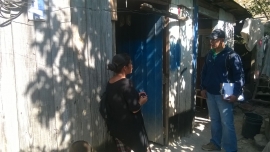by Antonio Valeriano
In the process of admission of the youth, the VTC does a socio-economical study to collect key information of the socio-economical and the family situation of the beneficiaries of the Centre: the main idea is to know the reality of each one of the youth who attend it.
This is a process that has a particular value, because it offers the youth with a low income the opportunity to study. To this purpose, the team in charge of the VTC looks for the youth in their communities and in their homes.
The majority of the youth who enter the VTC come from highly vulnerable areas, at risk of social exclusion, areas where bands and drug trafficking prevail and precariousness is a condition of living.
When the educators go to visit the zones, they meet all types of people: they have been attacked and threatened. And yet, they say, “it is worthwhile facing all sorts of risks”.
“Going to a house, a family, means reaching the heart of the youth, getting acquainted with their reality, their weaknesses, their pain and their concerns; it is knowing who they are. We can help them if we know their problems”, affirms Salesian Brother Oscar Pereira, who is in charge of the Centre and who also personally takes part in the visits in the quarters and peripheries of the difficult city of Tegucigalpa, to look for the young to whom he devoted his vocation of service.
The youth who every year attend full time the yearly or two-yearly courses of technical-vocational training, in sectors that are very requested by companies, number about 250; and in general those who follow other courses, which are usually held in the weekend, are about one thousand.
Ignoring the youth of today is “inacceptable, not only from an ethic point of view, but also from an economic one, because the new generations are the engine of our future”.



